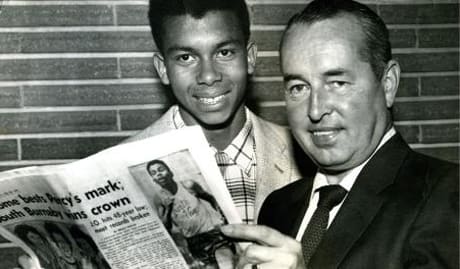Despite having only won a Bronze medal on the Olympic level at the 1964 Tokyo games, Harry Jerome set a total of seven world records in sprinting, primarily in the 100-metre and 100-yard dashes. Most notably, he broke the world record in 1960 at the Canadian Olympic Trials in Saskatoon for the 100-metre with a 9.90 runtime, but since he was an unknown and the races were hand-timed, the figure was rounded out to 10.0, which was a tie with the German record holder, Armin Hary.
This unprecedented success ultimately opened Jerome to vast public scrutiny, making him the darling of the Canadian media, something that shifted dramatically when a pulled muscle knocked him out of competition at the 1960 Olympics in Rome. This public persona ambivalence led to added speculation when the athlete eventually suffered a far more dramatic injury at the Perth Commonwealth Games in 1962, which led doctors to believe he would never walk again.
Charles Officer's documentary integrates these historical factoids into a thoughtful and moving portrait of a man driven to succeed in a time of political change. Being a black celebrity and entering into an interracial relationship in the early '60s during the Civil Rights movement made him a partial, reluctant advocate of social change, having an ideologue of constructive social responsibility and rationalism rather than one of radical public displays.
What works about Mighty Jerome is that while this context is clearly communicated throughout the film, interspersed with historical information and personal interviews with family, friends and fellow athletes, it's never protracted or preachy. This, like everything else, is evenly detailed with a calm, natural ease, heightened by the stationary, stylized black and white photography of the interview subjects in manufactured museums dedicated to Jerome himself.
Even if the details of the record-breaking sprinter's failed marriage and parental struggles are more hinted at than expanded upon – his ex-wife suggests that other women were available to him, but never outwardly states that he cheated – this does come off as a fair and balanced depiction of a flawed but well-intentioned man rather than something hagiographic.
(NFB)This unprecedented success ultimately opened Jerome to vast public scrutiny, making him the darling of the Canadian media, something that shifted dramatically when a pulled muscle knocked him out of competition at the 1960 Olympics in Rome. This public persona ambivalence led to added speculation when the athlete eventually suffered a far more dramatic injury at the Perth Commonwealth Games in 1962, which led doctors to believe he would never walk again.
Charles Officer's documentary integrates these historical factoids into a thoughtful and moving portrait of a man driven to succeed in a time of political change. Being a black celebrity and entering into an interracial relationship in the early '60s during the Civil Rights movement made him a partial, reluctant advocate of social change, having an ideologue of constructive social responsibility and rationalism rather than one of radical public displays.
What works about Mighty Jerome is that while this context is clearly communicated throughout the film, interspersed with historical information and personal interviews with family, friends and fellow athletes, it's never protracted or preachy. This, like everything else, is evenly detailed with a calm, natural ease, heightened by the stationary, stylized black and white photography of the interview subjects in manufactured museums dedicated to Jerome himself.
Even if the details of the record-breaking sprinter's failed marriage and parental struggles are more hinted at than expanded upon – his ex-wife suggests that other women were available to him, but never outwardly states that he cheated – this does come off as a fair and balanced depiction of a flawed but well-intentioned man rather than something hagiographic.
